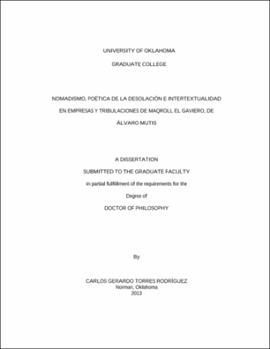| dc.contributor.advisor | Colín, José J | |
| dc.creator | Torres, Carlos Gerardo | |
| dc.date.accessioned | 2019-04-27T21:25:49Z | |
| dc.date.available | 2019-04-27T21:25:49Z | |
| dc.date.issued | 2013 | |
| dc.identifier | 99183276802042 | |
| dc.identifier.uri | https://hdl.handle.net/11244/318663 | |
| dc.description.abstract | This dissertation examines the role of nomadism, poetics of desolation and intertextuality present in seven of Álvaro Mutis's novels included in the book Empresas y tribulaciones de Maqroll el Gaviero. In this process I clarify the different and most suggestive theories alluding to displacement, I emphasize the use of an allegory to ruins as a fundamental characteristic of desolation, and I clarify intertextuality cases present in each of the novels striving to resolve a disperse chronology. | |
| dc.description.abstract | Chapter 1 analyzes Maqroll's wandering according to Joseph Campbell's proposal in order to establish a dialogue with The Odyssey in terms of the voyage and the characteristics of the art of drift (travesía hacia la deriva) based on Hédi Bouraoui's theory. Aditionally, it is confirmed how characteristics intrinsic to characters, objects and places are associated with the ruins and how these are fundamental to the poetics of desolation. Chapter 2 focuses on the myth of eternal return according to Mircea Eliade and makes a tribute to wandering as other forms of voyage transgression, proves how both acronía and delirio make reference to ruins and verifies how allusion is what defines the intertextuality component. Chapter 3 investigates the concept of the interrupted voyage in agreement with Michel Maffesoli's theory and the errant desire as its counterpart, based on Gilles Deleuze and Félix Guatarri's nomadology. This chapter also points out Maqroll's solitude reveals the poetics of desolation and studies the intertext and the interfigurality as an intertextual component present in each of the novels. Chapter 4 delves into the concept of the frontier as a limit of existential displacement from the central character, closing the dialogue with Homer's Odyssey as Maqroll's final voyage. The latter proves descending to an abysm as an idea tied to desolation and voyage, and emphasizes the use of allusions and intertexts between Alejandro Obregon's paintings and Mutis' texts. | |
| dc.description.abstract | The conclusions prove how the different variations in the voyage proposed by Mutis infringe in a Latin American tradition not only for the meaning of the voyage itself, the presence of the same main character in his seven novels, and the ars poetica, but for the elements that are associated with the ruins and the intertextuality. | |
| dc.format.extent | 292 pages | |
| dc.format.medium | application.pdf | |
| dc.language | es | |
| dc.relation.requires | Adobe Acrobat Reader | |
| dc.subject | Maqroll, el Gaviero (Fictitious character) | |
| dc.title | Nomadismo, poética de la desolación e intertextualidad en | |
| dc.type | text | |
| dc.type | document | |
| dc.thesis.degree | Ph.D. | |
| ou.group | College of Arts and Sciences::Department of Modern Languages, Literatures, and Linguistics | |
